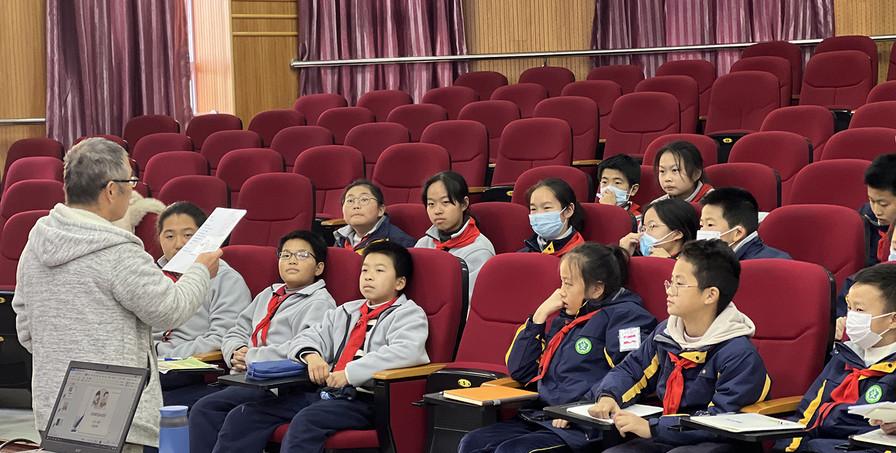
What kind of aesthetic power does poetic aesthetics inject into individual growth? How to attract more students in the classroom to appreciate the "poetic bloom of education"?
In Shanghai's Pudong New Area, the practice of a poet principal has attracted attention. A few days ago, the "Reading and Education" live broadcast column of "Shenxue Classroom" created by Xinhua Media of Shanghai Poster Industry Group walked into Xinyuntai Middle School, and principal Wang Xiaoyun continued to pay attention to the value of poetry education in his more than 20 years of education, leading teachers and students to explore and experience the beauty of poetry through reading and writing poetry.
When Wang Xiaoyun was transferred to the school as the principal in 2018, 93 of the 100 students were migrant children, with students from all over the country and different family backgrounds, which brought challenges to school management and teaching quality. In this regard, she wrote a small poem "Dividing Line" to encourage herself. In the poem, the role of the dividing line "another line / leading a new chapter" expresses the determination to "not correct the past / not afraid of the future / on the road to chasing dreams / dance against the wind".
Looking back on this journey, she said bluntly: "People are afraid of change, and they are afraid of the uncertainty brought about by change. We are often unsure whether we are capable enough to grasp these uncertainties. The new gimbal at that time was a new environment for me, and I was facing a lot of uncertainty. But I am sure that as long as I treat each other with sincerity, I can exchange my heart for sincerity, work hand in hand with the teachers, and teach with the students; I am more certain that opportunities are born in all changes. Her third collection of poems, Blossoms on the Clouds: The Poetic Bloom of Education, for the first time takes education as the theme of creation, with teachers and students as the objects of depiction, and familiar teaching scenes are full of poetry.
"The purpose of promoting poetry teaching is not to cultivate poets, but to cultivate children's more acute perception and penetrating expression, activate the depth, breadth and sharpness of thinking, use language as a bridge and carrier, and make thinking outward, from 'strong talk about worrying for new words' to improving to the silent moisturizing based on life experience." Wang Xiaoyun responds to the core values of poetry education from three aspects: aesthetics, tree morality and inheritance. She believes that poetry is one of the most beautiful literary art forms, and education should guide students to feel the beautiful art form with a sensitive heart. Poetry is an inner monologue, a dialogue with all things in nature, and with the help of poetry, we depict all the scenes, things, people, and things around us, and we can also express our views on certain phenomena. In the creative process, students' observation, imagination and expression will be well exercised.
When we present the various forms of life in the most condensed form with the help of words, poetry forms a wave between the author and the reader, giving birth to a new life experience. Tasting poetry is not only to taste the language and meaning of poetry itself, but also to taste the humanistic feelings and life patterns behind poetry. "The process of quality, paying attention to inner growth, following the reading law from sensibility to reason; it is the process of observing and examining the darkness and light, weak and strong in the heart, and thinking about life."
Because of Wang Xiaoyun's advocacy, the poetic seeds took root and sprouted in the hearts of the children in Xinyuntai and blossomed into brilliant flowers. Many of his poems have won prizes in competitions at various levels, and some of his student works have been published in journals. In the program, Wang Xiaoyun shared a story: one day at noon, she passed a classroom in the sixth grade, and a child chased out to show her the "poetry collection", "poetry collection" only has one poem, but the workmanship is written with the name of the publishing house, the publication date, and the book barcode. Two days later, the child showed the poetry collection to Principal Wang, and a second poem appeared on it...
In the poetic Xinyuntai campus, the teaching team uses poetry as an entry point to guide students to deeply understand the connotations of classical poetry and modern poetry, promote students' understanding of the deep spiritual core of Chinese culture, and let education generate more positive vitality in poetic bloom. In the garden school, there are 88 kinds of plants on campus, Wang Xiaoyun uses biodiversity as a metaphor for children's diversity - "good education should not erase children's diversity", and poetry education gives children rich experience and diversified growth.
It is reported that Xinhua Media, a subsidiary of Shanghai Poster Industry Group, has launched a new brand "Shenxue Classroom", with a special "Reading and Education" live broadcast column, which will select schools with characteristics in reading promotion from primary and secondary schools in 16 districts of the city, lead readers to "cloud" campus tours, carry out dialogue with principals, and find a mechanism for reading to promote education and promote the overall growth of students.
Image source: Shanghai Xinhua Media
Editor: Xu Yang
Editor-in-Charge: Xueying Wang
*Wenhui exclusive manuscript, please indicate the source when reprinting.